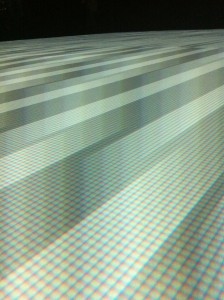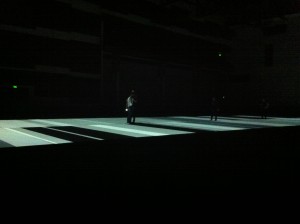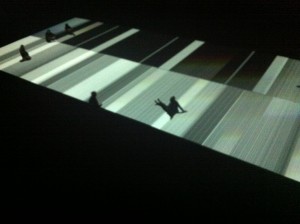I was reading about Ryoji Ikeda’s test pattern (No 5) as being perfect for iPhone documentation. How depressing. But it’s true, see my snapshots below.
Described as ‘a system that converts any type of data (text, sounds, photos and movies) into barcode patterns and binary patterns of 0s and 1s. Through its application, the project aims to examine the relationship between critical points of device performance and the threshold of human perception’. I’m not one for maths, but I am one for geometric abstraction. And critical points are, well, critical. But with such an undelineated and expansive data set, maybe the mesmeric power of this installation isn’t easily remembered now that I’m trying to do the work. And I’m reminded it’s important to do the work. Perhaps where the description above is actually ‘felt’ is in the midst of this installation where this giant barcode has a velocity beneath you; further encoding as well as encompassing your body within it.
I wonder about transmission of unspecified data being a valid or, worse, compelling starting point. Deconstructing of the ever apparent. (The experience and the press release needn’t correspond of course, but I went to thinking around Ikeda and suspect it’s important to put music brain on this rather than art brain. And I wonder if the difference between the two brains is an allowance for abstraction. Perhaps the experience of music is a more pure unfettered enjoyment in pattern-making, hinged more directly to its own form, rather than a historical world beyond the form. Of course so much has been written on this. But it did make me think how listening can be quick and repetitive, and looking can be a slower unfurling.
…Sometimes a blog link is as good a gift as you can get. I’m enjoying Love dog, even when it’s a bit maudlin:
The internet is so nerve-racking for me. I’m still not used to it. It’s like looking at an X-ray all day long—of yourself, of others, of a culture. Nothing feels safe. In an email, I ask my mother why even success (reblogs, retweets, viral attention) feels shitty on the internet. How I always feel sullied afterwards for some reason. How even when the response is good, it feels bad, and makes me want to hide even more than I already do. She writes: ‘But this is the disadvantage of publishing on line. With it comes instant gratification and instant humiliation’. The internet doesn’t require you to have thicker skin. It requires you to have no skin. Which makes everything feel painful unless you learn to feel no pain at all.
…There is a (crowd-sourced) project called Printing Out the Entire Internet. MOMA’s first poet laureate, Kenneth Goldsmith has rented a 500 square metre gallery space in Mexico City, with 6 metre high ceilings to be filled with sheets of A4 paper. An homage to Aaron Swartz, the co-founder of Reddit. Of course the project is being slammed by organisations such as Change.org as a maximalist monument to unnecessary waste. But that’s Goldsmith’s argument, unnecessary waste to somehow quantify and monumentalise unnecessary waste.
Ryoji Ikeda, test pattern (No 5), 8 June – 1 July 2013, Carriageworks, Sydney.




